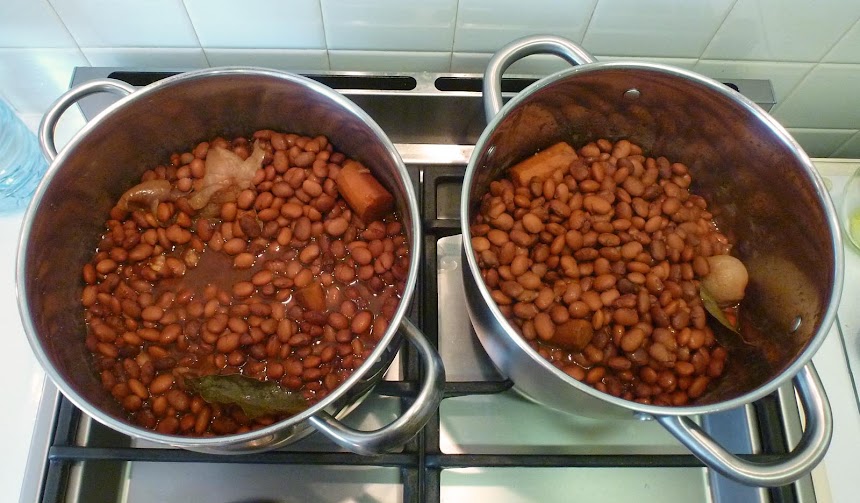 |
| Haricots beurre from Portugal |
Well, actually, I think I'm the winner, because the beans called haricots beurre or "pink beans" that I cooked over the weekend seem nearly perfect to me. The are tender, including the skins, and they didn't break apart or turn to mush in the cooking water. I've already enjoyed eating some of them as a side dish with a grilled duck breast (filet de canard). I've put half of what was left into the freezer. Now I think I'll make Boston baked beans with the other half. Walt and I both like baked beans.
So the experiment was to cook two batches of dried beans, one in distilled water (eau déminéralisée) and the other in spring water (eau minérale). I used beans from a one-kilogram package, and I cooked 500 grams of them in one kind of water and 500 grams in the other kind. Before this, I've cooked different kinds of dried beans (white, red, pinto) in our local tap water, which is quite calcaire or "hard," and the results have been fairly mixed. As often or not, beans cooked in tap water end up having tough skins or, if cooked longer, turn to mush. The beans I've had the best luck with have been black-eyed peas.
To test the effect of the cooking water on the finished beans, I cooked two batches side by side, seasoned identically — bay leaf, carrot, onion, black pepper, garlic powder — and, most importantly, no salt. I soaked the beans in the water they were going to cook in, but only for about an hour. Then I just put them on to cook in the soaking water. I added more water during the cooking, and I was careful not to get the two kinds of water mixed up. The two batches cooked for about 4½ hours. A ce moment-là — si j'ose dire — les carottes étaient cuites...
There was virtually no difference between the two batches. I ended up just mixing them all together in the same pot and eating some, as I said, with duck. I salted the beans at the end of the cooking time and added a little bit of duck fat to give them good flavor. I could have added olive oil, butter or bacon fat, but since duck was the meat of the meal... Excellent.




Because of my aching back, I didn't pursue my own experiment. The beans are still soaking in the refrigerator!
ReplyDeleteOne thing I've read is that dried beans might start fermenting if you let them soak too long.
DeleteLook at this page of information about fermenting beans.
DeleteWhy does the salt make a big difference? Maybe a dumb question....i don't know...
ReplyDeleteI love Boston baked beans, though. One can never have too many lardons in a dish. ;-)
The conventional wisdom is that salt in the cooking water will harden the beans' skin. Vinegar, tomato, or anything acidic supposedly has the same effect. So I don't salt the beans until the skins have softened.
DeleteI've also learned, by the way, that salt in the water you cook rice or potatoes in is not a good idea. My rice is much better now that I don't salt it until after it's cooked, and my potatoes don't split and fall apart. If fact, I mostly cook potatoes in the steamer these days.
Great advice about not adding salt to the coking water for rice and potatoes. I'll remember that, thanks.
DeleteSo, the result is that you know that, as long as you don't use your tap water, your beans will cook up nicely, without having a tough skin?
ReplyDeleteJudy
At least those particular pink beans cooked up tender. But I think every bag or box of dried beans is different. The growing conditions were different for each batch and you never know how old the beans are. Next time I want to eat beans, I'll choose some I've had trouble with before and cook them in bottled water to see if it makes a difference.
DeleteYes thanks for the heads regarding salt and rice as well. I'll tell Danny...he makes it all the time.
ReplyDelete